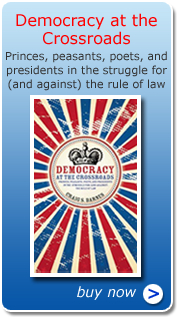The war on terror has no victory marker and therefore no time limit. The president says that it could last indefinitely. For those who are not served by democracy or who may primarily have an economic interest in war this may be a profitable thing. For those who are interested in power politics and military expansion or the pursuit of empire, this is a good thing. But for democracy this is a bad thing.
In 1980, Ronald Reagan was elected president in reaction to Iranians seizing American hostages. The crisis was so shocking that the country turned away from Jimmy Carter, a decent, honest, church-loving leader to a more belligerent, aggressive leader who had almost no grasp of the details but a great feel for the American mood of anger and search for revenge. We also turned away from open-hearted, democratically inspired techniques and reverted instead to shady deals like the Iran-Contra financing which was consciously intended to evade and skirt the law prohibiting funding for the right-wing Contras in Nicaragua. The deal was illegal and Reagan himself later had to deny that he had known. The American people forgave him because he had persuaded us that we were in a global war and war excuses a little lying.
Ronald Reagan believed that military power to wipe out evil was a grand challenge although he had no experience of real war (outside of the movies), and so Reagan completely ignored the advice of an earlier republican president Dwight Eisenhower. Eisenhower, who had seen the awful, bloody side of war was no romantic. The difference between these two republican presidents marks the turning in American politics wrought by terror. Eisenhower did not see America’s power in her military, but rather in her schools and libraries, and he said so. He warned against the military-industrial complex and the awful costs that war would bring if we continued to feed the military machine. But Reagan, more sentimental, threw Eisenhower’s warnings aside and in the almost 25 years since Reagan the war on terror has taken its toll on both the law and truth which, in turn, has brought the whole of the democratic experiment into jeopardy.
Look at what one small example of what the war on terror does to truth: George W. Bush told the 9/11 commission that had he known about the Al Qaeda cells in the US he would have taken action. In fact he had been told about these cells on numerous occasions, by his terrorism advisors, by out-going president Clinton, by an intelligence briefing of August 6, 2001. The 9/11 Commission knew of many more such warnings. Bush was not leveling with them. The Commission, however, did not push the point. They did not say, Mr. President, the record is contrary, or the record belies what you are saying, or aren’t you being a little loose with the truth here? It was a time of war and the Commission gave the truth a little slack.
Look at what the war on terrorism does to the law: When the president went to war in Iraq he violated the UN Charter—to which we are legally bound—and which allows a pre-emptive war only in the face of imminent danger. Hussein was about as dangerous as any other dictator and the world was full of dictators and we had lived with them all, by the dozens, for many generations. We chose to preemptively strike against an empty balloon. According to Kofi Annan, the Secretary General of the UN and the majority of legal scholars in this country the law was violated; the Nuremberg conventions, the Geneva Conventions, have all been violated. But the American people have chosen to ignore a little illegality because we are at war.
Perpetual war, to go on as long as the president alone decrees, promises perpetual damage to truth and to law, to institutions of restraint and compassion, until gradually over the years there may come a point at which legal restraint and open truth telling are no longer admired, no longer thought to be the foundation of our society. When that happens we will start living a history of power and empire but not of free government. Sadly, as we have fought for democracy in Iraq we have undermined the essentials for our own republic here at home. Saddam Hussein was a puffy braggart, indeed, but the loss of 1,050 young lives and our own moral and legal foundations are a high price to pay to become the braggart police of the world.
